In this article:
The number of people who suffer from a heart attack every second is alarmingly high. All over the world, people who suffer from heart disease are increasing every day, and sudden death from cardiac arrest and heart attacks is also on a rise.
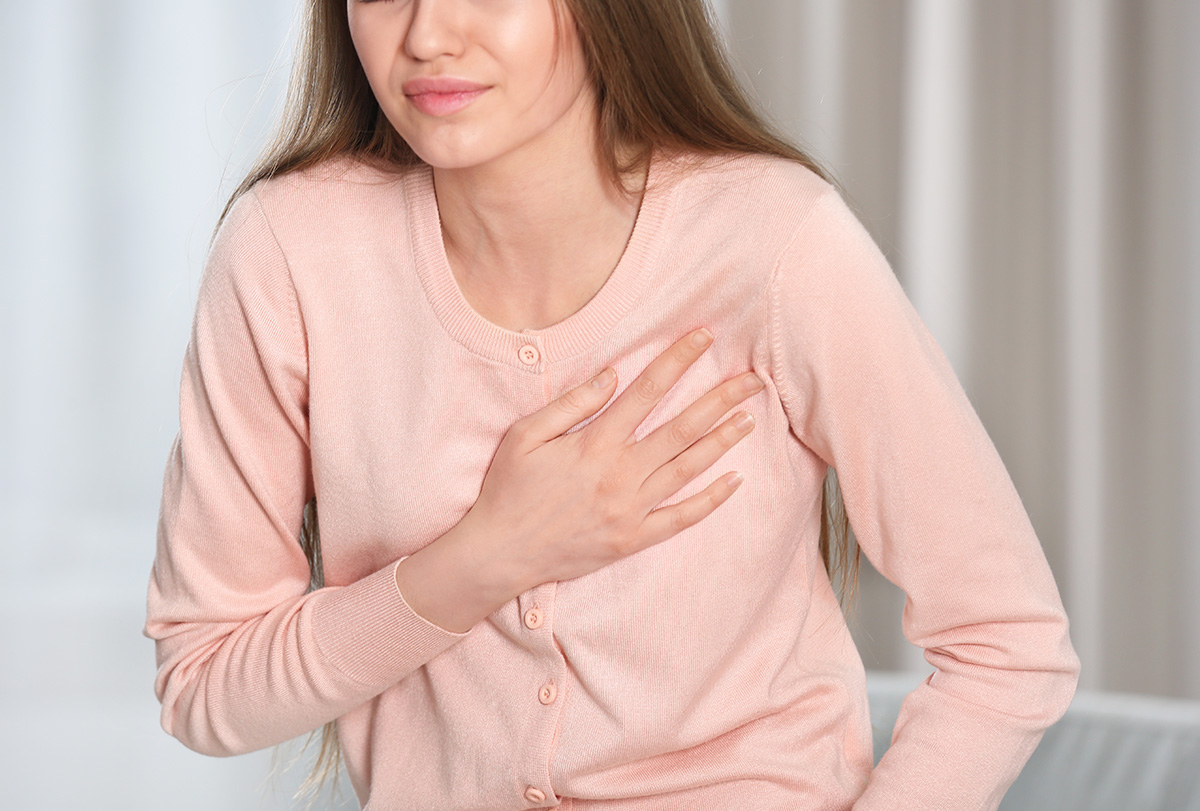
According to the World Health Organization (WHO), cardiovascular diseases are the primary reason of death worldwide, causing approximately 17.9 million deaths each year. Cardiovascular diseases are a group of ailments of the heart and blood vessels. These include coronary heart disease, cerebrovascular disease, and rheumatic heart disease.
Around ⅘ of cardiovascular deaths are because of heart attacks and strokes. Also, ⅓ of these deaths happen in people under 70 years of age. Opposite to widespread belief, more than ¾ of these deaths happened in low- or middle-income nations with men and women being similarly affected.
A heart attack is also called myocardial infarction in medical terms, and according to the Centers for Disease Control and Prevention, more than 800,000 people in the USA have a heart attack each year.
On a brighter note, 80% of premature heart attacks and strokes can be avoided. A healthy diet, regular physical activity, and discontinuing the use of tobacco products are pivotal to preventing heart issues. (1)
Look into what a heart attack is, how it happens, and how to spot it before it happens to save someone’s life.
What Is a Heart Attack?
You must know that every organ in your body requires a good supply of oxygen, which is carried by the blood for the body to function properly. When this flow of oxygen-rich blood is not met sufficiently in your heart because of a blockage in the coronary blood vessel, a heart attack can happen.
A heart attack does not mean that your entire blood circulation to the heart is cut, but it means that some percentage of your heart is unable to receive proper blood flow because there is a blockage in the artery. That part of the heart is unable to receive the proper amount of oxygen and is, therefore, unable to pump blood properly. (2)
Warning Signs of a Heart Attack
The worrisome part is that those who suffer from a heart attack may not even get the chance to get medical treatment or care because they die before reaching the hospital.
There are ways you can look for signs of a heart attack days before it happens. (3) You can also seek medical attention before your heart condition worsens. It is important to note that even young people can get a heart attack, which can end up being life-threatening.
Here are some signs you look out for to spot a heart attack before it happens.
1. Chest pain
Pain in the chest and chest discomfort can be associated with a heart attack. The pain that comes from underlying heart issues is bearable and doesn’t have to be debilitating. The pain can often also spread to other parts of the body such as your hands, shoulders, and jaws.
Another point to note is that some people also experience discomfort in the chest area. There is a feeling of pressure inside the chest, which can be explained as tightness or constriction.
Chest pain sometimes is predictable, especially after doing some physical activity, which can put a strain on your clogged arteries. But other times, even without any physical strain, chest pain can occur at any time.
It is very easy to confuse chest pain arising from heart issues with other factors such as indigestion, poor posture, or exertion. (4)
2. Shortness of breath
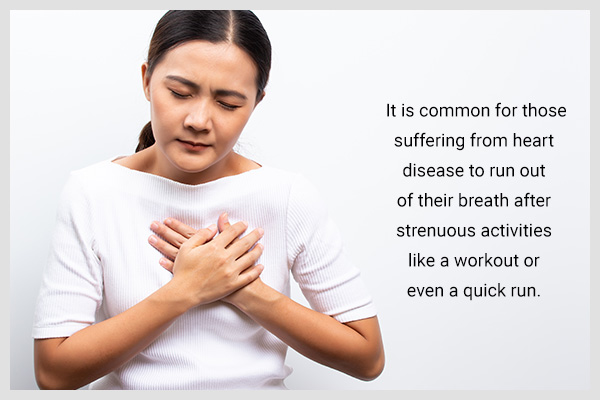
Any extra strain on your body will put extra pressure on your heart. It is common for those suffering from heart disease to struggle with their breath after strenuous activities such as a workout or just a quick run.
If you suffer from something like this, you have to keep a check on your heart health because this can lead to a heart attack pretty quickly.
It has been observed that those who struggle with shortness of breath are at higher risk of heart issues than those who do not experience the same.
The clogged arteries will cause the weakening of your heart muscles because they cannot pump blood properly if they do not receive enough blood supply. This causes you to have issues with breathing and leads to a heart attack. (5)
3. Weakness
Every organ of your body needs to receive sufficient blood flow, and their oxygen requirements should be met. Since it is the responsibility of the heart to ensure all this goes well, any obstruction or clogging in the coronary arteries will hinder the circulation of blood.
This will lead to an insufficient blood supply to other organs, because of which your body may end up getting fatigued and you may feel dizzy very easily. Sometimes you may even feel weakness without even doing anything physically straining or exerting. (6)
4. Erectile dysfunction
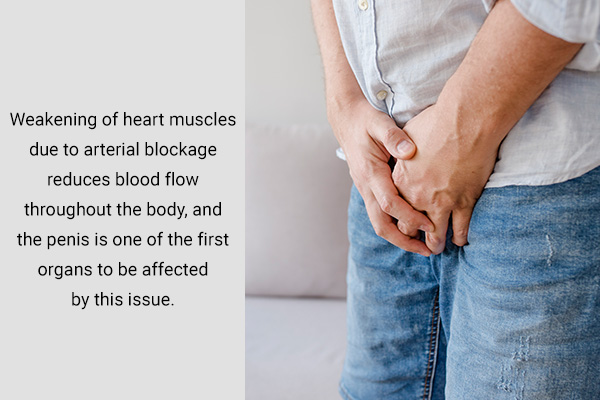
When your heart muscles become weak due to arterial clogging, the penis is one of the first organs that get affected by this issue. The arteries are responsible for supplying blood to all the parts of the body, including the heart.
For erection of the penis to occur, then there should be a rush of blood in the penis. If you have blocked arteries, this can prevent this flow of blood and lead to erectile dysfunction.
If you have been suffering from erectile dysfunction for more than a couple of days, you should go to a cardiologist or a doctor because it can be a sign of underlying heart issues. (7)
5. Nauseating feeling
You are now aware that clogging of the arteries will lead to a weak heart and insufficient pumping of blood to the body. This means that blood flow to other important body systems such as your digestive tract will also be hindered, which can cause nausea and intestinal cramps.
Digestive problems and vomiting without any underlying health issue can be a sign of a blockage in the arteries and can indicate heart problems. (8)
6. Palpitations
The sensation where you feel like your heart is pounding a lot is called palpitations.
They usually occur when a person undergoes feelings of discomfort or shock or is exposed to triggers such as stress and anxiety. Excessive consumption of alcohol and caffeine are also culprits in palpitations.
But what is important to note is that if your palpitations are accompanied by symptoms such as feeling dizzy or if you have been suffering from palpitations for quite a while without any underlying reason, they can be because you have heart issues and clogged arteries. (9)
7. Pain in the teeth and jaw
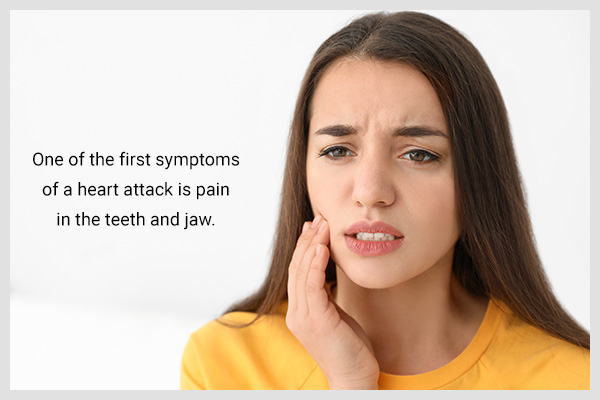
One of the first symptoms of a heart attack can be pain in the teeth and jaws. This pain is called referred pain and doesn’t mean that you have a dental condition to be treated.
A simple way to know if your toothache is referred pain or not is that referred pain should persist despite using a local anesthetic.
There are several hypotheses for how heart attack affects the jaw and teeth, but nothing has been proven by available studies. (10)
8. Shoulder pain
According to a study, physiotherapists have had patients with life-threatening pathologies such as acute myocardial infarction that mimic musculoskeletal pain such as shoulder pain. This means that having persistent pain in your shoulder can be due to underlying heart issues.
Another point highlighted by the study is the shift in shoulder pain symptoms from the right to the left shoulder as an unusual presentation of acute myocardial infarction. (11)
What Causes a Heart Attack?
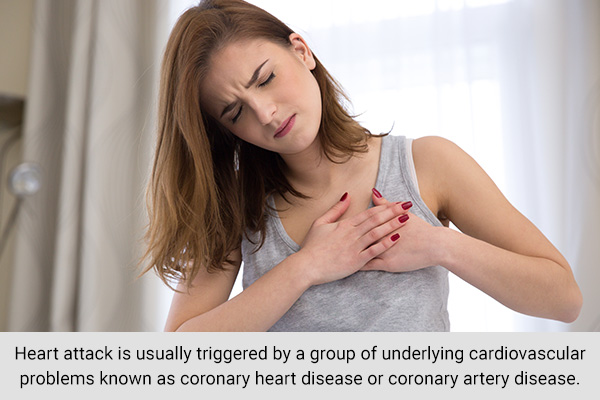
A heart attack is usually due to an underlying group of diseases called coronary heart disease or coronary artery disease. This is when your arteries, which carry blood to the heart, are blocked or clogged, leading to a reduced blood supply.
What can cause this to happen is high levels of cholesterol, which is why you must have heard that it is highly recommended to always control your cholesterol levels.
Other than this, waste materials and calcium entering the bloodstream can also cause a blockage if they attach to the walls of the arteries. This leads to a buildup of plaque, which narrows down the space in the arteries, causing them to have a blockage. (2)
Symptoms of a Heart Attack
The symptoms of myocardial infarction include: (12)
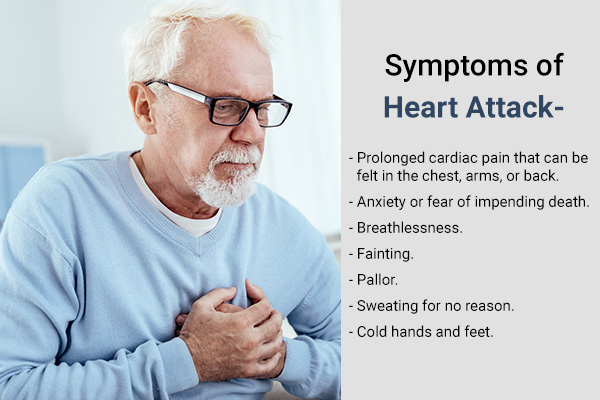
- Prolonged cardiac pain or pain in the chest, arms, or back (The pain in the chest is like a feeling of tightness, heaviness, or constriction in the chest.)
- Anxiety or fear of impending death
- Nausea and vomiting
- Breathlessness
- Collapse
- Physical signs
- Pallor
- Sweating
- Cold peripheries
Sudden death from ventricular fibrillation or asystole may happen instantly and many deaths occur within the first hour. This is why it is important to know about the “golden hour” in heart attacks.
It has been found that for each hour of delay, 1.6 fewer lives were saved per 1,000 patients treated. The first hour after the beginning of a heart attack is called the golden hour, and appropriate action within this hour can reverse its effects in the majority of the cases. (13)(14)
Risk Factors for Heart Attacks
The factors that can put you at risk of a heart attack include: (2)
- High blood pressure
- High cholesterol levels
- Diabetes
- Smoking
- High blood pressure or preeclampsia (high blood pressure during pregnancy)
Expert Remarks
Nowadays, it is common to see a lot of people dying of heart attacks even at a relatively young age. Even though we cannot declare that all young people die from abusing drugs, it continues to be one of the primary reasons for heart attacks in young people.
Using stimulants such as cocaine, amphetamines, and methamphetamines (crystal meth) can lead to a narrowing of coronary arteries, impeding blood supply, which can trigger a heart attack. A heart attack from the use of cocaine is one of the leading causes of sudden death in young people. (15)
Moreover, it is important to bring awareness to metabolic syndrome, which comprises high blood pressure, high blood sugar levels, excess body fat around the waist, and abnormal cholesterol levels. (16)
Remember, a heart attack is a serious medical emergency that needs instantaneous treatment. There are also heart attacks known as silent heart attacks, which can happen without any indications or with very mild symptoms. They are more noted in older adults and in people who suffer from high blood sugar or diabetes because the nerves responsible for pain sensation are harmed due to neuropathy. (17)
Lastly, never take a chance in life! If you are feeling pain in your heart or chest, visit your nearest hospital or a medical facility immediately or call an ambulance.
Most-Asked Questions About a Heart Attack
How is an earlobe crease related to heart problems?
Having an earlobe crease can also be indicative of clogging in the artery. According to a study, more than 50% of people suffering from coronary artery disease had a diagonal earlobe crease.
So, if you notice an earlobe crease, make sure that consult a doctor because this can be a sign of heart problems. (18)
Is excessive sweating related to a heart attack?
When your heart is unable to pump blood sufficiently to the body under normal circumstances, it is even harder for it to pump blood while doing any physical activity.
Any kind of exertion can lead to your body sweating excessively. However, it is important to note that if you sweat excessively even after very little activity, it means your heart has some trouble pumping blood and requires a checkup. (19)
What can I do to lower the risk of heart attacks?
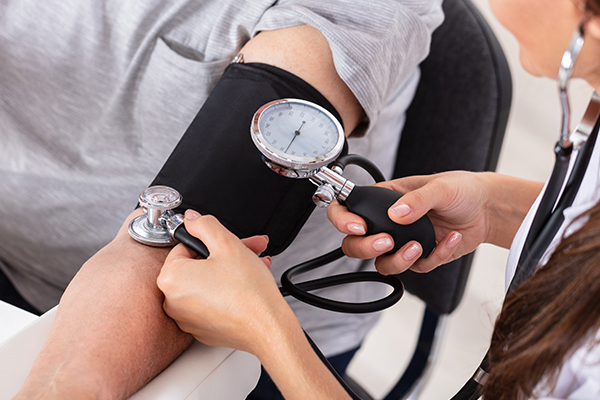
Here are some tips to lower the risk of heart attacks according to experts and research: (20)(21)(22)
- Get your blood pressure reviewed once every year, if not after every 6 months. If your blood pressure is on the higher side, strive to reduce it through medicinal therapy or lifestyle interventions.
- Stay on top of your blood sugar levels, and if you suffer from diabetes or have a family history, get tested after every 6 months.
- Keep your cholesterol levels in control.
- Quit smoking.
- Maintain a healthy body weight.
- Choose the right diet that includes vegetables, fruits, fish, whole grains, lean meat, soy products, nuts, and legumes such as lentils, chickpeas, and kidney beans. Also, prefer canola, corn, olive, safflower, sesame, sunflower, and soybean oils (instead of coconut or palm oil).
- Manage stress and seek the help of a therapist, if required.
- Sleep for at least 8 hours.
- Anyone over the age of 14 years should consume less than 2,300 mg of sodium in a day. This amount is even less for people with hypertension.
- Limit the use of sugar.
- Aim to have a healthy body mass index (BMI).
- Limit the intake of alcohol.
- Men and women are advised not to drink more than 14 units of alcohol in a week. Spread your drinking over 3 or more days if you do drink as much as 14 units a week.
Final Word
Your heart is the most important organ in your body, and it is safe to say it is the powerhouse of your body because it is responsible for providing oxygen and blood to all the other organs to keep them functioning in a healthy way. The heart can be also compared to a water motor pump.
Heart issues will not only lead to heart attacks and other heart-related problems but will also negatively impact all the other bodily functions and systems. They can hinder your daily activities and can even be very life threatening.
It is, therefore, important to keep a check on your heart health irrespective of your age and to look out for signs and symptoms that may point to an unhealthy heart and heart problems. This can be achieved by regular checkups to avoid serious complications in the future.
- Was this article helpful?
- YES, THANKS!NOT REALLY


